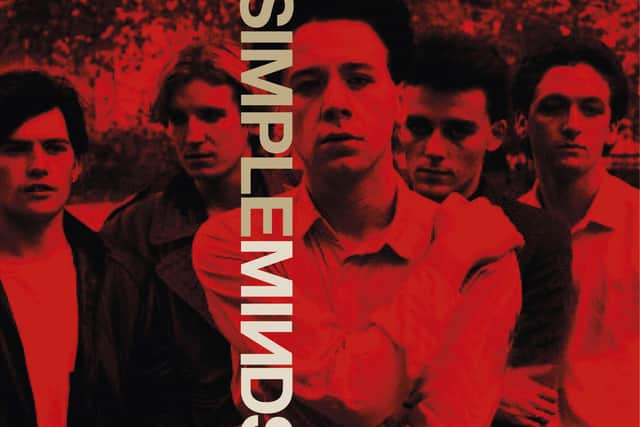Themes For Great Cities: New book charts origins of Scottish music trailblazers Simple Minds
and live on Freeview channel 276
But nearly 45 years after they emerged from Glasgow’s post-punk scene, the full story of Simple Minds is only now being told in an officially-endorsed book.
Themes For Great Cities, by Graeme Thomson, features recollections from all the key players in their history – as well as insights into how they influenced Primal Scream, the Manic Street Preachers, Peter Gabriel, Mogwai and Chvrches.
Advertisement
Hide AdAdvertisement
Hide AdMuch of the book explores the period between the spring of 1979 and the autumn of 1982, when they released six albums drawing influences from the punk, pop, disco, electronica and rock music they embraced.
The earliest origins of the band can be traced back to Prospecthill Circus, in Toryglen, near Hampden Park, in Glasgow’s south side, where founding members Jim Kerr and Charlie Burchill, mainstays to this day, were brought up.
They played Lou Reed, T. Rex, The Doors, The Velvet Underground and David Bowie covers together in a high school band – Biba-Rom! – which they formed with Brian McGee and Tony Donald.
The book recalls the struggles of Kerr, who became Simple Minds front man, at school – and well into his 20s – due to a stutter.
Advertisement
Hide AdAdvertisement
Hide AdHe says: “The teachers wanted to put me in a different school. I remember my mother going up and sorting that out.
“Outside of my safety zone, I wouldn’t speak to anyone. Even going into a shop could be humiliation.”
Recalling his first encounter with the band, journalist Billy Sloan says: “Jim had a really terrible stammer. It took him 20 minutes to answer every question.
"If I’d met him [before I had seen the band play], I would have said that the last place I would ever see that guy was behind a microphone stand with a spotlight on him.”
Advertisement
Hide AdAdvertisement
Hide AdThe school band played just one gig, but, inspired by the punk explosion, formed Johnny & The Self Abusers with fellow former Holyrood High School pupils John Milarky and Allan McNeill in 1977.


They split after just one single, but Milarky recalls: “Jim and Charlie were kind of inseparable. They were smart enough to see that they might be able to have a career out of this.”
A defining moment for Kerr came when they were about to play at Terminal 1 in Glasgow, but had to wait until the DJ played a new 12-inch single – I Feel Love, which became Donna Summer’s global disco sensation.
Kerr said: “We’d spent the day doing interviews with punk rock fanzines, talking about how punk was the be all and end all, and I’m standing there thinking ‘punk’s finished. Gone. We need to get a synthesiser’. I remember thinking that clearly.”
Advertisement
Hide AdAdvertisement
Hide AdBilly Sloan was at Satellite City in Glasgow when Simple Minds – named after a line in David Bowie’s song The Jean Genie – played their first gig in January 1978.


He says: “I thought they were amazing, just astounding. Just the way they looked – not punk rock, more art rock.
“Jim didn’t look like anyone who I worked alongside or I had been to school with. He looked like he could have come from Berlin, not the high flats in Toryglen.”
Key influences on the young Kerr and Burchill included the “experimental European repertoire” at the Citizens Theatre in the Gorbals, arthouse movies at the GFT and hitch-hiking trips from Glasgow.
Advertisement
Hide AdAdvertisement
Hide AdKerr recalls: “We ended up going all through Europe, a mixture of staying in youth hostels and sleeping out. It was really something. We became aware of the world out there.”
Recruiting keyboard player Mick MacNeil and a new bass player, Derek Forbes, Simple Minds recorded a six-track demo and built a significant following playing more than 50 gigs in 1978, support slots with Siouxsie and The Banshees, Generation X and Ultravox.
A crucial champion was Bruce Findlay, founder of a chain of celebrated Scottish record shops and the record label Zoom, who helped them secure their first record deal and became their manager.


Recalling his first encounter with Kerr in his Edinburgh office, Findlay says: “He came in with a wee bit of eyeliner on. Dyed-black hair, painfully serious.
Advertisement
Hide AdAdvertisement
Hide Ad"I fell in love with the guy. I thought he was brilliant and I liked his brain. I liked his reasoning. Also, I liked the way he looked. To me, it was kind of Brando-ish, like a method actor or something.
"Jim was mesmeric. He was the best front man I had ever seen of that generation. Word was spreading fast. And rightly so. Because they were brilliant.”
Primal Scream singer Bobby Gillespie saw some of the earliest incarnations of Simple Minds play in Glasgow, when their sound was being influenced by the likes of Donna Summer, Chic, Diana Ross, Talking Heads and Bowie.
He says: “It wasn’t like a rock-and-roll gig, it wasn't like punk or high-energy rock like The Clash or The Jam. It was moody and atmospheric. They were an incredibly powerful live band.
Advertisement
Hide AdAdvertisement
Hide Ad"Jim Kerr was a great front man. He had an alienated look. I was thinking ‘how do you come out of Prospecthill Circus and be like this?’”
By spring 1982, Simple Minds had their first top 20 single, Promised You A Miracle, and made their Top of the Pops debut.
Within months, their sixth album New Gold Dream had hit number three. The next three would all go on to claim the top slot.
Recalling the impact of Promised You A Miracle, Kerr says: “It changed everything. Sitting on a Sunday waiting to see what the chart position was, we’ve never done that before. It took us into a whole new world.
"Everything about the times, everything about the song, everything about what we were coming up with, felt like, yes, this will be the moment when we get to be Simple Minds."
Comment Guidelines
National World encourages reader discussion on our stories. User feedback, insights and back-and-forth exchanges add a rich layer of context to reporting. Please review our Community Guidelines before commenting.
